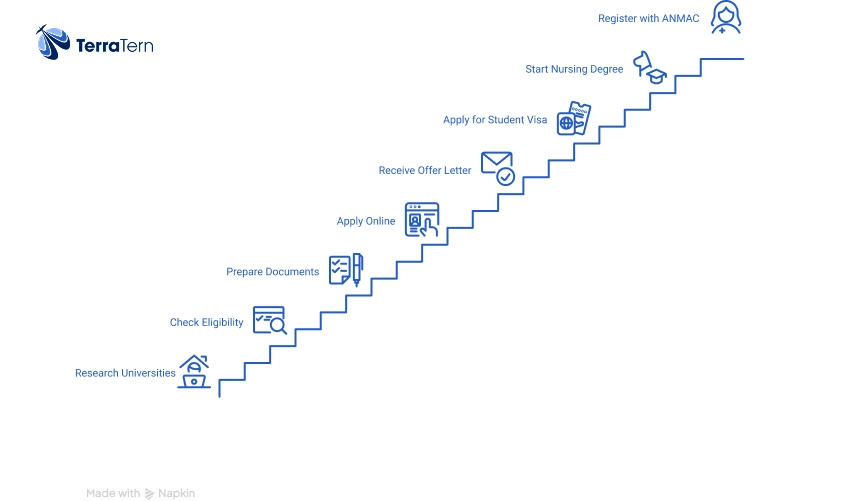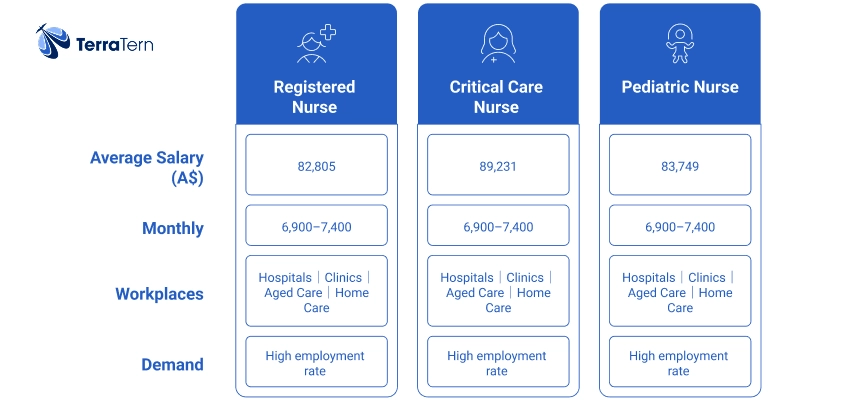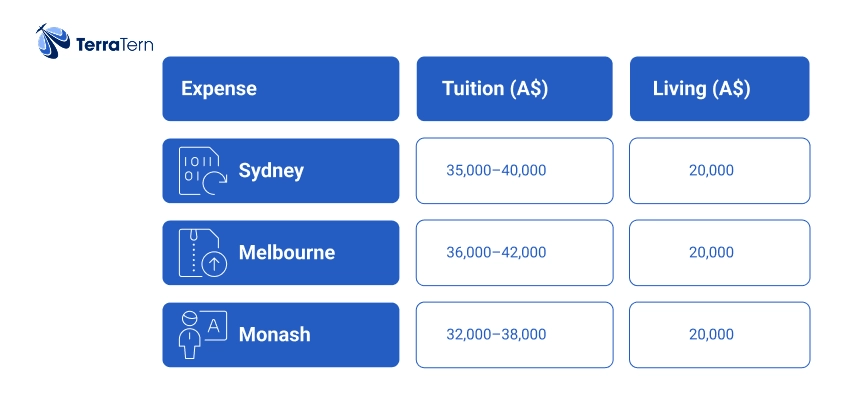Key Highlights
- Why Pursue a BSc in Nursing in Australia?
- Exploring the Pathway to Nursing Excellence in Australia
- Significance of BSc Nursing in Australia
- Meeting the Growing Demand for Healthcare Professionals
- Overview of BSc Nursing in Australia Courses
- Cost of Studying BSc Nursing in Australia
- Top Colleges for Pursuing BSc Nursing in Australia
- Scholarships and Financial Aid
- Job Opportunities by Pursuing BSc Nursing in Australia
- BSc Nursing Salary in Australia Per Month & Annually
- How Can I Apply for a BSc in Nursing in Australia from India?
- Conclusion
Why Pursue a BSc in Nursing in Australia?
-
High-Quality Education: Australian Universities are some of the best universities in the field of Nursing and are renowned for maintaining high standards.
-
Global Recognition: A BSc Nursing degree from Australia is recognised and respected worldwide, opening up international career opportunities.
-
Multiple Specializations: Australian institutions have plenty of specialities within BSc Nursing, allowing students to choose the subjects of their interests.
-
Practical Training: Most Australian universities have a more hands-on approach, allowing students to gain field experience.
-
High Employment Rate: Graduates of BSc Nursing programs in Australia have high employment rates due to the country's demand for qualified healthcare professionals.
-
Support for International Students: Australian universities have many support systems for international students. This makes Australia an excellent place to study abroad.
Exploring the Pathway to Nursing Excellence in Australia

In this guide, we will look into the details of how you can pursue a BSc nursing in Australia, BSc nursing in Australia fees, BSc nursing salary in Australia, BSc nursing salary in Australia per month, and BSc nursing course duration in Australia. We will look deeper into the courses offered by various universities across Australia and the fees and career opportunities for people aiming to contribute to the medical and healthcare sectors. With the increasing demand for healthcare professionals, studying BSc Nursing in Australia offers a promising and rewarding career path.
Significance of BSc Nursing in Australia
Nursing remains one of the most critical foundations of healthcare systems in the world, and Australia also occupies its place. Consequently, Australian universities have set high standards of working and studying, focused on providing the best patient care to the community; aspiring nurses get the knowledge and skills that will enable them to succeed in this noble vocation. The duration of the BSc nursing course in Australia provides an excellent career prospect for students.
Meeting the Growing Demand for Healthcare Professionals
There has never been a greater demand for qualified nurses than today, when health challenges are at an all-time high and demographics are shifting. Australia expects to have more elderly people who need care due to the population growing fast and the fact that the healthcare system is changing over time. Hence, there will be a need for more skilled nursing professionals soon. Therefore, doing a BSc in nursing in Australia assures growth on an individual level and makes an essential contribution to meeting national medical requirements.
Overview of BSc Nursing in Australia Courses
Here is a brief overview of the different BSc Nursing programs offered in Australia, including the time the course takes, areas of specialization, and details on certification. The goal of these programmes is to train students in medicine so that they can become successful professionals in this field. These courses usually last three or four years and involve theoretical classes and practical sessions in clinical settings.
Important Features in BSc Nursing Programmes:
-
Key Areas: Anatomy, Physiology, Microbiology, Pharmacology Pathophysiology
-
Clinical Placements: Training in hospitals and community health care facilities, where hands-on experience can be gained.
-
Fields of Specialization: Paediatric Nursing, Mental Health Nursing, Emergency Room (ER), Adult Critical Care Unit and more
-
Accreditation: Programs accredited by the Australian Nursing and Midwifery Accreditation Council (ANMAC).
Also Read: Apply Working Visa in Australia: Types, Benefits, Process
Cost of Studying BSc Nursing in Australia

Students need to know how much they will spend on their studies if they choose this degree. The BSc nursing in Australia fees, as well as the BSc nursing fees in Australia for Indian students, include tuition fees and living expenses such as accommodation, food, transport, and health insurance, among others.
Here is a breakdown of the Expenses Incurred While Undertaking BSc Nursing in Australia fees:
-
Fee Structure: The BSc nursing in Australia fees are approximately AUD 20,000 - AUD 35,000 per annum. The BSc nursing fees in Australia for Indian students, as per these figures, are around INR 1,102,133 to INR 1,928,522.
-
Accommodation: In addition to BSc nursing in Australia fees, there is an accommodation of around AUD 20,000 annually covering rent or mortgage repayments for residential property inhabited by the candidate during his/her course tenure. This also includes electricity and water bill charges.
-
Food: Average cost per year could be estimated to be about AUS $7000-$10000, depending on the individual’s dietary habits (including both groceries purchased from supermarkets/outlets within close proximity to one’s residence hall, and Applicable to various dining out options available at or near campus vicinity).
-
Transportation: Commuting to class can require about $1000 each way, i.e. if someone takes public means, this would mean spending approximately $2000 per year, whereas those using private cars might incur fuel maintenance costs not exceeding $3000 over a year.
-
Healthcare Schemes: Overseas Student Health Cover (OSHC) is mandatory for international students. This would also be required if you apply for a visa to Australia. Check with your local embassy or consulate for the costs.
Top Colleges for Pursuing BSc Nursing in Australia
Here is the list of the top Universities for BSc Nursing in Australia:
|
Universities |
Approximate Tuition Fees (AUD) |
Approximate Tuition Fees (INR) |
Pros |
|
University of Sydney |
35,000 - 40,000 per year |
20,70,000 - 23,70,000 per year |
Prestigious University. high-quality education, extensive research facilities |
|
Monash University |
32,000 - 38,000 per year |
18,90,000 - 22,40,000 per year |
Innovative curriculum, strong industry connections |
|
University of Melbourne |
36,000 - 42,000 per year |
21,30,000 - 24,80,000 per year |
Global reputation, diverse clinical placements |
|
University of Queensland |
33,000 - 39,000 per year |
19,50,000 - 23,10,000 per year |
Comprehensive training, supportive learning environment |
|
Deakin University |
30,000 - 35,000 per year |
17,70,000 - 20,70,000 per year |
Flexible study options, strong focus on practical experience |
|
Griffith University |
29,000 - 34,000 per year |
17,10,000 - 20,10,000 per year |
State-of-the-art facilities, strong community engagement |
|
University of Technology Sydney (UTS) |
31,000 - 37,000 per year |
18,30,000 - 21,90,000 per year |
Industry-relevant curriculum, excellent student support services |
|
Curtin University |
28,000 - 33,000 per year |
16,50,000 - 19,50,000 per year |
Diverse study options, strong emphasis on research |
|
University of Newcastle |
27,000 - 32,000 per year |
15,90,000 - 18,90,000 per year |
Innovative teaching methods, excellent clinical training |
|
Australian Catholic University (ACU) |
26,000 - 31,000 per year |
15,30,000 - 18,30,000 per year |
Values-based education with, a strong focus on holistic nursing practice |
Scholarships and Financial Aid

There are several types of BSc Nursing in Australia scholarships for foreign students in Australia. These grants are aimed at reducing the cost of education and can be from colleges, government institutions or private organizations – Each BSc Nursing scholarship in Australia for international students varies depending on the provider; however, some cover part-time work while others do not provide any financial assistance.
Here are some scholarships provided:
-
Australia Awards Scholarship Programme (AAS)
-
International student scholarships offered by universities
-
Private sector scholarships in the healthcare industry.
Also Read: Gateway to Nursing Jobs in Australia
Job Opportunities by Pursuing BSc Nursing in Australia
The need for nurses is substantial and increasing in Australia due to an ageing population, advancements in medical technology, and more available healthcare. BSc Nursing graduates can work in various healthcare with a good prospectus of BSc nursing salary in Australia, such as:
-
Hospitals can be placed in general wards or emergency rooms (ERs), intensive care units (ICUs) and special units, e.g. oncology or paediatrics.
-
Health Centers- These may include community clinics that offer services to schools within the vicinity and even provide home-based care for patients who cannot get out of their homes due to reasons such as old age or physical disability.
-
Aged Care Facilities- here they care for old people mostly found at residential homes because most need special attention that cannot be given to them at home where there is no one around during the day, while others may also require nursing homes where they are taken care of throughout day and night.
-
Private Sector Establishments- working with physicians among other professionals under these institutions, like private clinics, where some may operate solo depending on area size served by such facilities. Generally speaking, the majority will still prefer being employed within large cities since there is a higher demand for nurses there than anywhere else within country boundaries.
-
Governmental Bodies and Non-Governmental Organisations (NGOs)- participating in different public health projects, which could involve vaccination campaigns against some diseases or even setting up health camps in rural areas can also be pursued.
Also read: Immigration To Australia: Everything You Need To Know
BSc Nursing Salary in Australia Per Month & Annually
Here is a detailed table showing the BSc nursing salary in Australia per month and annually as well:
|
Specialization |
Average Annual Salary (AUD) |
Average Monthly Salary (AUD) |
Average Annual Salary (INR) |
Average Monthly Salary (INR) |
|
Registered Nurse (General) |
A$82,805 |
A$6,900.42 |
4.17 million |
347,500 |
|
Critical Care Nurse |
A$89,231 |
A$7,435.92 |
4.52 million |
376,667 |
|
Mental Health Nurse |
A$85,107 |
A$7,092.25 |
4.31 million |
360,833 |
|
Pediatric Nurse |
A$83,749 |
A$6,979.12 |
4.22 million |
351,667 |
|
Emergency Nurse |
A$87,482 |
A$7,290.17 |
4.43 million |
370,833 |
|
Midwife |
A$84,529 |
A$7,044.12 |
4.27 million |
355,833 |
|
Operating Room Nurse |
A$88,154 |
A$7,346.20 |
4.46 million |
371,667 |
|
Public Health Nurse |
A$81,472 |
A$6,789.33 |
4.12 million |
343,333 |
|
Oncology Nurse |
A$86,298 |
A$7,191.50 |
4.37 million |
364,167 |
How Can I Apply for a BSc in Nursing in Australia from India?
Here is a step-by-step guide on how you can apply to Universities in Australia; this guide may apply to students interested in applying from other countries as well:
-
Research about the Universities: Look at different institutions where this program is offered. Create your shortlist.
-
Check if you are Eligible: You should have achieved specific grades in high school to join any college or university. The language proficiency test is also required for international students.
-
Prepare all documents needed: Arrange your papers, starting with the most recent ones, which include certificates from previous learning institutions and transcripts, among others. You must also write a personal statement detailing why they should allow you to study with them.
-
Apply Online: This can be done through their website or by using centralised admission service providers many have subscribed to, like UAC, VTAC, or QTAC in Australia.
-
Visa Application After Receiving the Offer Letter: If an institution accepts your request, then it means that other things besides finances are okay. Confirm this by checking if they have been sent through email.
-
Show Financial Capability: Be ready to provide evidence showing the ability to pay for tuition fees plus other related costs while living there, as specified by immigration laws regulating entry into different countries worldwide, but more so under the Commonwealth Nations agreement signed between Australia and India concerning education matters.
Read More: Top 10 Highest Paying Countries For Nurses
Conclusion
Going for a BSc in nursing in Australia is a life-changing process that assures a promising medical profession. The world-class education system, different clinical exposures, and exemplary job opportunities make Australia the best place for anyone wanting to become a nurse. To lead successful academic lives in nursing, students must follow these steps and meet the set requirements.
To secure admission to BSc nursing in Australia, you can contact TerraTern. With vast experience and expertise in immigration services, TerraTern can help you get to your dream destination simply!








